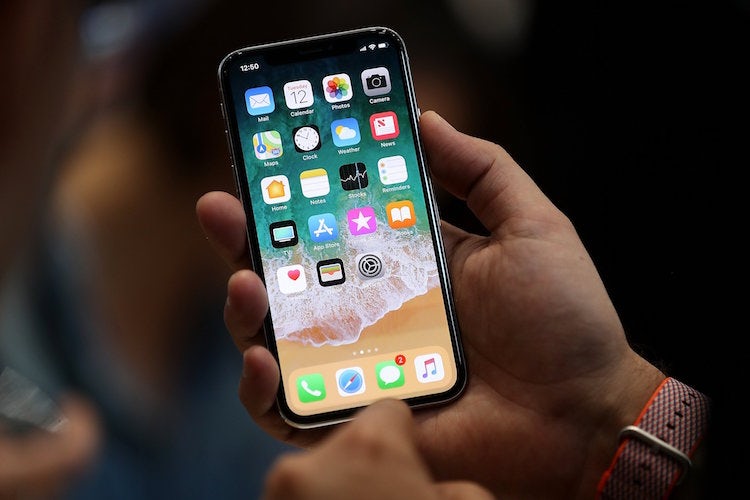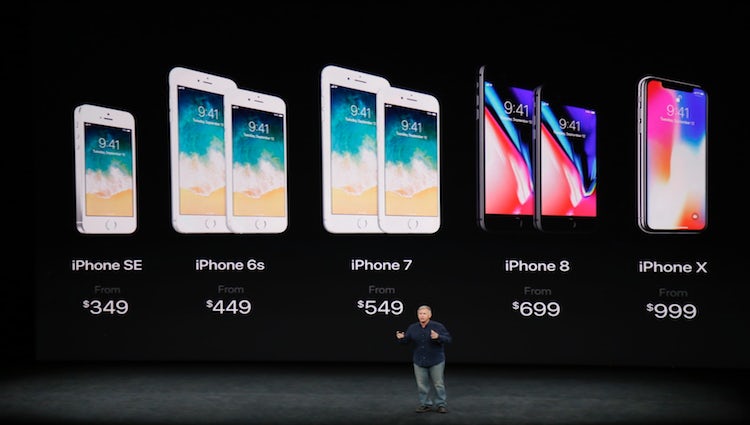Apple gambles on premium iPhone X but should its rivals be worried?
The launch of the $999 iPhone X has been labeled a PR success, but is it really the ‘biggest leap’ since the original iPhone?

Apple has unveiled its highly anticipated premium $999 iPhone X (pictured above), which drops the home button for an all-screen design.
The X has exclusive features such as an advanced facial recognition system, which lets users create 3D masks of their faces that can be mapped onto ‘animojis’ and allows selfies to be used to unlock the device. It also contains Apple’s latest processor – the A11 Bionic – which is 70% faster than the iPhone 7 and extends battery life by over two hours.
According to Apple’s chief executive Tim Cook, the iPhone X marks the “biggest leap forward since the original iPhone”.
Alongside the iPhone X, Apple also unveiled two other new smartphones, the iPhone 8 and 8 Plus, which are essentially updated versions of 2016’s iPhone 7 and 7 Plus. While they also contain the A11 chip, it’s a less advanced version and the phones lack the X’s striking all-screen design.
Making in-roads on the premium end
Despite well-publicised manufacturing issues around its previous Note 7 phone, the high-end Note series has been a sales success for rival Samsung allowing it offer far more pricing options than Apple. The X will allow Apple to compete more effectively in this premium end of the smartphone market.
Forrester analyst Thomas Husson says Samsung will be concerned about the X. He tells Marketing Week: “The iPhone X really delivers Apple’s brand DNA. It would not have been realistic to expect them to completely disrupt the smartphone market again, but they will gain innovation leadership and showcase the fact that smartphones’ role is evolving in an increasingly connected world.
“Samsung will be concerned – not just from Apple, but also Huawei and increasingly from strong Chinese contenders like Vivo or Oppo, given the breadth of their growing smartphone portfolios.”
He says Apple has a better brand ecosystem and believes the Samsung Galaxy S8’s AI assistant Bixby, which has seen its Western launch repeatedly delayed, remains a stumbling block,
It is important to remember that Samsung manufactures the OLED screen displays for the new iPhone X. It makes money if iPhone sells, and it makes even more money if Samsung Galaxy sells. It’s a win-win situation!
Ben Stanton, Canalys
“Samsung lacks a direct brand ecosystem and software DNA to compete with Apple in the longer term,” says Husson. “While Apple needs to accelerate with Siri and intelligent agents, Samsung is even further behind with Bixby.”
Canalys’ analyst Ben Stanton agrees that the X could be a knockout blow in terms of who controls the high-end smartphone market. But he believes the underwhelming 8 and 8s will also play into the hands of the Samsung.
He explains: “Samsung may find it difficult to compete with iPhone X at the high-end, but it will fancy Galaxy S8 in lower price bands against a modestly upgraded iPhone 8.
“Also – it is important to remember that Samsung manufactures the OLED screen displays for the new iPhone X. It makes money if iPhone sells, and it makes even more money if Samsung Galaxy sells. It’s a win-win situation!”
Justifying the X’s price through marketing

But with Brits having less disposable income as the Brexit negotiations continue to dent consumer confidence, is launching a smartphone that will cost in excess of £1,000 really a good idea?
“The price of iPhone X, at $999, will test the limit of what a consumer is prepared to pay for a smartphone,” replies Stanton. “However, Apple is strongest in countries where mobile carriers are a critical part of the sales cycle. In the UK for example, customers will stretch the cost of iPhone X over 24 months, and the astronomical upfront price will not be as much of a barrier as many believe.”
In order for Apple’s three new smartphones to be a marketing success story, Stanton believes they must double down on artificial intelligence and augmented reality to show how the iPhone is doing more in this growing space than its rivals.
Meanwhile, Forrester’s Husson says design will play a key role. Apple’s biggest branding task, he believes, is convincing customers it is only in its “teen years” when it comes to innovation: “The key is to highlight the new design of the phone and to showcase how new technologies will change the way we interact with our device and the world around us,” he adds.
“Apple must demonstrate that smartphones are only entering their teen years and that their role – while evolving – will continue to power new disruptive technologies blending the physical and digital worlds. That’s why I’d expect Apple to let its brand partners and developers emphasise facial recognition and augmented reality experiences above anything else.”
Disruption remains key to Apple’s success

According to Brand Z data from Kantar Millward Brown, Samsung indexes a score of 154 compared to Apple’s 130 in the UK – a score of 100 is considered to represent an average brand. In the US, the figures are 144 for Samsung and 133 for Apple.
And Martin Guerrieria, global BrandZ research director at Kantar Millward Brown, questions whether Apple’s brand is strong enough to support a premium phone such as the iPhone X. He warns: “While Apple’s brand does support a premium offer, the scale of what’s being reported feels like a leap of faith based on existing brand alone. Consumers will need to perceive a range of game-changing benefits to justify that expense, particularly in a market where the pace of upgrades has slowed.”
However, overall, Apple remains the world’s most disruptive brand in the BrandZ Most Valuable Global Brands 2017, indexing 148 compared to 126 for Google and 100 for the average brand. This reputation, Guerrieria adds, will hold it in good stead to make the X a success.
He concludes: “On the 10th anniversary of the original iPhone, Apple needs to demonstrate it can live up to this disruptive reputation.”






